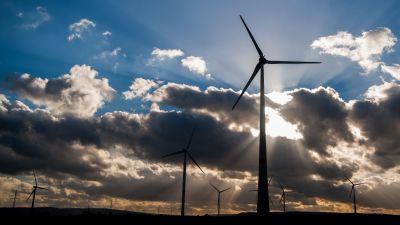Up Close: How NI can be a world leader in tackling climate crisis

Northern Ireland may be small, but it produces more carbon emissions per head of population than China – on the other hand, it is up there with the world leaders when it comes to renewable energy.
In a special climate edition, ahead of the Cop26 summit in Glasgow, UTV’s Up Close examines the efforts already being made locally to play a part in tackling the crisis unfolding around a world increasingly under threat.
Northern Ireland may not be enduring the worst effects of global warming, but it is far from immune, as unpredictable heatwaves and sporadic but intense flash floods show.
“There’s rarely a year goes by now when something notable doesn’t happen at some point in the year,” Met Office forecaster John Wylie tells programme presenter Jordan Moates.
“Climate change is very much something that is happening in Derry, Dromore, Lisburn, Newry, Belfast, outside your front door…”
And in a region where farming plays such a major role in the economy and in the fabric of everyday life for its many rural communities, erratic weather is much more than just an inconvenience.
Experts say we will simply have to move on from old ways of doing things and look to new, greener technology and innovations to live and work more sustainably.
Agriculture Minister Edwin Poots, who has proposed his own climate bill – legislation that has long been missing at Stormont - for the Northern Ireland Assembly to consider, instead of supporting an earlier bill tabled by the Green Party, tells Up Close tangible action is needed.
“I believe there’s lots of people who want to claim credit for being environmentalists and they will make a lot of noise about what should be done in terms of meeting targets, but are doing nothing in terms of actually creating the circumstances to meet those targets,” he says.
Meanwhile, farmers have voiced serious concerns about any legislation being imposed with the potential to set targets requiring significant cuts within their sector, fearing both job losses and an impact on food production.
However, research has been underway for quite some time now and progress is being made in the bid to find workable solutions that balance the needs of various sectors with better outcomes for the future of our planet.
Up Close goes behind the scenes at the AFBI research farm in Hillsborough where, amongst many other projects, they are investigating ways to basically reduce the methane emitted by cows – through cross-breeding, varying feeds, and much more.
As just one example of the thinking outside of the box that is going on, researchers are looking at the impact of introducing seaweed to cows’ diets to cut methane production.
“If you’ve ever been to the North Ronaldsay islands in Scotland, the North Ronaldsay sheep, they actually feed predominantly on seaweed and actually they cannot feed too much on grass because they get an imbalance in their diet. So it’s not really as uncommon as you would think,” Professor Sharon Huws explains.
“And the levels that actually go into the diet are extremely low, it’s something like 0.5% of what they’re consuming in order to get that 80% reduction.”
From our energy production to waste water treatment and rubbish recycling, experts seem to agree more can always be done and we can all play our part to make Northern Ireland greener.
Up Close also meets one family who have taken that to extremes, living off the grid in their effort to be as sustainable as possible.
Radical as their approach may seem, they are realistic about its wider appeal.
“I’m absolutely not saying to anybody you should live like this,” Steve Golemboski-Byrne tells Up Close.
“But I think lots of people are being told that they’re going to have to change the way they live - and hopefully, we’re kind of providing some answers to how, what that might look like.”
More information